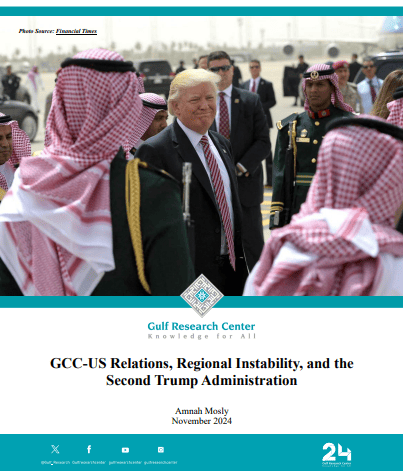
President-elect Trump’s victory in the US elections has generated a wave of reactions. In the Gulf region, however, there is a certain degree of optimism about his second term. This positive outlook is reflected in the congratulatory messages sent to Trump from key leaders in the Gulf Cooperation Council (GCC), emphasizing the importance of US relations in promoting regional stability and security.
Saudi Arabia’s King Salman sent a cable of congratulations, praising the Saudi-US relations and emphasizing “the shared desire to further strengthen these bonds in all areas.” HRH Prince Mohammed bin Salman, Crown Prince and Prime Minister, also sent a cable of congratulations and, in a phone call, expressed Saudi Arabia’s “eagerness to strengthen the longstanding strategic and historic ties” between the two countries.
The remaining GCC countries, as well as the GCC Secretariat, have also sent congratulations to the president-elect. Sheikh Mohamed bin Zayed Al-Nahyan, President of the United Arab Emirates, emphasized the importance of the UAE-US relationship and stated, “We look forward to continuing to work with our partners in the US toward a future of opportunity, prosperity, and stability for all.” Qatar’s Amir, Sheikh Tamim bin Hamad Al-Thani, said he looked forward to “working together again in promoting security and stability both in the region and globally” as Qatar is both a key mediator in Gaza and hosts the largest US military base in the Middle East. Bahrain, Kuwait, and Oman have also issued similar statements.
This backdrop of optimism is set against the achievements of Trump’s first term, where he prioritized strengthening ties with the GCC—especially in areas like economic cooperation and regional security. In his first term, Trump placed the Middle East high on his agenda: Trump chose Saudi Arabia for his first foreign visit as president in 2017. Not only was the visit symbolic and underlined the importance of Saudi-US relations, but it also led to significant economic and defense agreements between the two countries. It is thus expected that the trend will continue, and the two countries will emphasize strengthening both security and economic cooperation.
However, several concerns linger that could complicate these relations. The first would be the socalled “no response” of the US to the missile attacks on Saudi Arabia’s Khurais and Abqaiq oil facilities in September 2019, which raised questions about the reliability of US security assurances. Another concern is President-elect Trump’s support for Israel. Although some Gulf states have normalized relations with Israel through the Abraham Accords brokered under his first term, Trump’s commitment to Israel could strain GCC-US relations. This is timely as the region continues to be proactive in charting its own course. One example here is the Saudi-led Global Alliance for the Implementation of the Two-State Solution. On October 30 and 31, 2024, the Kingdom hosted a high-level meeting for the Global Alliance for the Implementation of the TwoState Solution, in line with the Kingdom’s efforts to reach a settlement to the crisis in the Palestinian territories and the devastating war on the Gaza Strip.
Undoubtedly, the wars in Gaza and now Lebanon will be at the top of Trump’s Middle East agenda. Throughout his campaign, the president-elect consistently promised to bring the wars to an end. Nevertheless, many in the Gulf remain cautious; Trump’s first term involved actions that aligned closely with Israeli interests, including the controversial recognition of Jerusalem as Israel’s capital in 2017, which faced significant pushback from Gulf states, particularly Saudi Arabia. These past decisions add layers of complexity to his administration’s potential foreign policy direction in the Middle East.
As President-elect Trump prepares for his second term, the appointments for key roles in his administration offer a glimpse into his potential approach to Middle Eastern policy.
Marco Rubio as Secretary of State: The Florida Republican Senator and former member of the Foreign Relations Committee and the Select Committee on Intelligence brings extensive foreign policy experience. While his strong commitment to Israel has been a defining feature of his political career, he has also advocated for stronger ties with Gulf countries as a US effort to counter the influence of Iran, where he is expected to be more hawkish.
Pete Hegseth as Secretary of Defense: The Fox News host and military veteran is another proIsrael and Iran hawk. He has also been sharply critical of Washington’s European allies, including NATO.
Steven Witkoff as Special Envoy to the Middle East: The real estate developer and golf partner does not have any known experience in diplomacy or the Middle East but is a staunch supporter of Israel. As the US Special Envoy to the Middle East, he will be in charge of Trump’s two main priorities for the region: an Israel-Palestine peace deal and normalization of relations between Israel and Saudi Arabia.
Mike Huckabee as Ambassador to Israel: The Former Governor of Arkansas’s nomination received the most support from Israel out of all of Trump’s picks due to his unwavering commitment to Israel. In the past, Huckabee has claimed that “there is no such thing as a West Bank” and “no such thing as a Palestinian.”
These appointments reflect a Trump administration poised to deepen its alignment with Israel while maintaining strong ties with the Gulf states, particularly Saudi Arabia. However, balancing these relationships against the backdrop of the Gaza conflict and broader regional instability will require careful diplomacy. The key issue here will be how the president-elect will bring an end to the war with a pathway for Palestinian statehood, as a two-state solution has been a firm prerequisite for Saudi Arabia in normalizing relations with Israel. This balancing act will be a significant challenge for the new administration and could have far-reaching implications for US foreign policy in the Middle East.
*Amnah Mosly is a Researcher at the Gulf Research Center (GRC)

